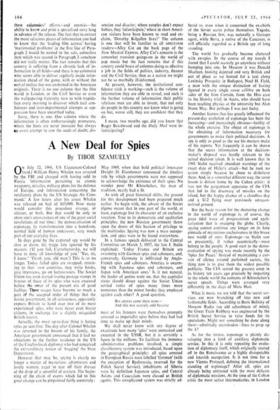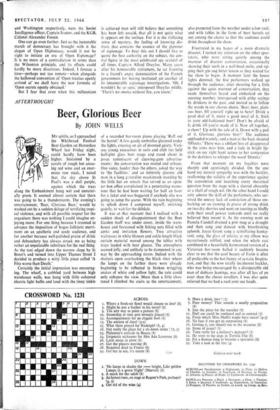A New Deal for Spies
By TIBOR SZAMUELY
N July 12, 1966, US Lieutenant-Colonel (retd.) William Henry Whalen was arrested by the FBI and charged with having sold to Russia 'information pertaining to atomic weaponry, missiles, military plans for the defence of Europe, and information concerning the retaliatory plans by the US Strategic Air Com- mand.' A few hours after his arrest Whalen was released on bail of $15,000. Now many would consider this procedure strange, or sinister, or both. But that would be only to show one's unawareness of one of the great social revolutions of our time: the democratisation of espionage, its transformation into a humdrum, normal field of human endeavour, very much part of our everyday lives.
In days gone by the captured spy, would be shot at dawn, his tragic fate ignored by his masters. ('If you fail, Carrutherovsky, we will have to deny all knowledge of you."Yes, sir, I know.' Thank you, old man.') This is so no longer. Today failed spies are swapped; return- ing to their own countries, they write books, give interviews, go on lecture-tours. The Soviet Union has even started issuing postage stamps in honour of those of its spies who were executed before the onset of the present era of good feelings. These usages have become so much a part of the accepted order of things that the Soviet government, in all seriousness, apparently expects Britain to hand over two of its most experienced spies, who were never even Soviet citizens, in exchange for a slightly misguided British tourist.
Actually, the most up-to-date thing is letting spies go scot-free. The day after Colonel Whalen was returned to the bosom of his family, the American government announced that it had no objections to the further residence in the US of the Czechoslovak diplomat who had conceived the extraordinary notion of 'bugging' the State Department.
However that may be, spying is clearly no longer a matter of mysterious adventurers and lovely women, eager to tear off their dresses at the drop of a spoonful of caviare. The begin- ning of the chain of events which led to this great change can be pinpointed fairly accurately : May 1960, when that bold political innovator Dwight D. Eisenhower renounced the timeless rule by which governments were not supposed to acknowledge the existence of their spies. No wonder poor Mr Khrushchev, the man of tradition, nearly had a fit.
As with all great historical shifts, the ground for this development had been prepared much earlier. To begin with, the advent of the Soviet regime meant that in one part of the world, at least, espionage lost its character of an exclusive vocation. True to its democratic and egalitarian principles, the new Russian government threw open the doors of this bastion of privilege to the multitudes. Spying was now a mass occupa- tion, and spies were to be found everywhere.
In a famous speech delivered to the Central Committee on March 3, 1937, the late J. Stalin explained: 'Today France and Britain are swarming with German spies and saboteurs, and, conversely, Germany is infiltrated by Anglo- French spies and saboteurs. America is swarm- ing with Japanese spies and saboteurs, and Japan with American ones.' Is it not natural, the leader of genius went on, that the capitalist states should direct against the Soviet Union serried ranks of spies many times more numerous than the minor hordes they employed against each other? A good question,
But answer came there none—
And this was scarcely odd because most of his listeners were themselves promptly arrested as imperialist spies before they had had time to make up their minds.
We shall never know with any degree of exactitude how many 'spies' were unmasked and executed in the USSR, but it is certainly a figure in the millions. To facilitate the immense administrative problems involved, a simple classificatory system was introduced, based upon the geographical principle: all spies arrested in European Russia were labelled 'German' (with the exception of Byelorussia, reserved for the Polish Secret Service), inhabitants of Siberia were by definition Japanese spies, and Central Asians and Caucasians were classed as British agents. This complicated system was strictly ad-
hered to, even when it concerned the ex-chiefs of the Soviet secret police themselves. Yagoda, being a Russian Jew, was naturally a Gestapo agent, while Beria, a native of the Caucasus, is still officially regarded as a British spy of long standing.
The world has gradually become cluttered with ex-spies. In the course of my travels I found that I could scarcely go anywhere without bumping into one. In Moscow it was Donald Maclean, looking dejected and very British and out of place as we hunted for a taxi along Leninsky Prospekt; in Budapest, Noel H. Field, a man with the unique distinction of having figured in every single cause célebre on both sides of the Iron Curtain, from the Hiss case to the Slansky trial; in Accra, who should have been teaching physics at the university but Alan Nunn May. But perhaps I was just lucky.
Another feature that has greatly influenced the present-day evolution of espionage has been the increasing—and increasingly obvious—futility of the whole exercise. The object of espionage is the obtaining of information necessary for governments to make their political decisions. A spy is only as good as the use his masters make of his reports. Yet frequently it can be shown that the secret information at the decision- maker's disposal was hardly relevant to the actual decision taken. It is well known that in 1941 Stalin received abundant warnings of the exact date of Hitler's attack—but he took no action simply because he chose to disbelieve them. And, in a somewhat different way, the same lesson is driven home by the Cuban crisis: it was not the gargantuan apparatus of the CIA that led to the discovery of missiles on the island, but the happy chance of a cloudless day and a U-2 flying over previously unrecon- noitred ground.
But the basic reason for the shattering change in the world of espionage is, of course, the great tidal wave of progressivism and egali- tarianism that is sweeping the globe. Clearly, spying cannot continue any longer on its lone pinnacle of mysterious exclusiveness in this brave new world of ours. Espionage—as Stalin saw so presciently, if rather eccentrically—must belong to the people. A good start to the demo- cratisation of spying was made recently by the 'Spies for Peace.' Instead of maintaining a cur- tain of silence around purloined secrets, the thing now is to give them the widest possible publicity. The CIA scored the greatest coup in its history ten years ago precisely by imparting to the whole world the contents of Khrushchev's secret speech. Things were arranged very differently in the days of Mata Hari.
What is more, we are told that the secret ser- vices are now branching off into new and fashionable fields. According to Boris Belitsky of Moscow Radio (an old schoolmate of mine), the Great Train Robbery was engineered by the British Secret Service to raise funds for its operations. Might not something be done along these—admittedly unorthodox—lines to prop up the £?
As for the future, espionage is plainly de- veloping into a kind of auxiliary diplomatic service. In this it is only repeating the evolu- - Lion of diplomacy itself, which originally started off in the Renaissance as a highly disreputable and knavish occupation. Is it not time for a new Vienna Protocol, defining the international standing of espionage? After all, spies are already being entrusted with the most delicate of diplomatic missions. At the time of the Cuban crisis the most active intermediaries, in London
and Washington respectively, were the Soviet Intelligence officer, Captain Ivanov, and the KGB, Colonel Alexander Fomin.
One can go even further. Just as the inexorable march of democracy has brought with it the slogan of Open Diplomacy, would it not be right to initiate an era of Open Espionage? It is no more of a contradiction in terms than the Wilsonian principle, and its effects could hardly be more disastrous. Indeed, I foresee a time—perhaps not too remote—when alongside the hallowed convention of 'Open treaties openly arrived at' we shall have the new formula of 'Open secrets openly obtained.'
But I fear that even when this millennium is achieved men will still believe that something has been left unsaid, that all is not quite what it appears on the surface. For it is the titillating sense of mystery, the feeling of knowing dis- trust, that contains the essence of the glamour of espionage. To bear this out I should like to quote the best authority on the subject, the cen- tral figure in the most celebrated spy scandal of all times, Captain Alfred Dreyfus. Many years after his honourable retirement, he sat listening to a friend's angry denunciation of the French government for having instituted yet another of its innumerable espionage investigations. 'Oh, I wouldn't be so sure,' interposed Dreyfus mildly. 'There's no smoke without fire, you know.'







































 Previous page
Previous page